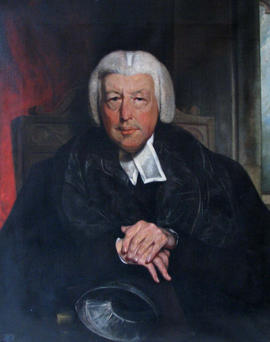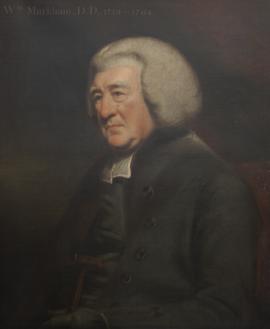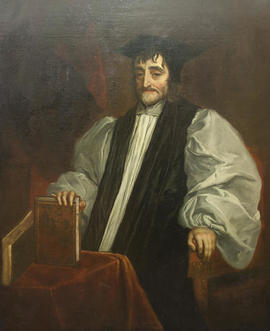ATTERBURY, FRANCIS, brother of Lewis Atterbury (qv); b. 6 Mar 1662/3; adm.; KS 1674; elected head to Christ Church, Oxford 1680, matr. 17 Dec 1680, aged 17, Westminster Student 18 Dec 1680-94 (void, perhaps on marriage), Tutor 1687-90; BA 1684; MA 1687; BD and DD 5 May 1701; replied to Obadiah Walker’s attack upon the Reformation 1687; assisted his pupil Hon. Charles Boyle in his defence of the genuineness of the Epistles of Phalaris against Bentley; ordained; Lecturer, St. Bride’s, London 1701; Chaplain in Ordinary to William III and Queen Mary, subsequently to Queen Anne; warmly opposed Erastianism and protested against the suppression of Convocation; Archdeacon of Totnes 11 Jun 1701-13; Prebendary of Exeter 6 May 1704; Dean of Carlisle 2 Oct 1704; Prolocutor of Lower House of Convocation 1710; Dean of Christ Church, Oxford, 28 Sep 1711-3; installed Dean of Westminster 16 Jun 1713 and consecrated Bishop of Rochester 15 Jul 1713; although he took part officially in the coronation of George I, he refused to sign the declaration of confidence in the government after the rebellion of 1715, and subsequently was in direct communication with the Jacobites; arrested and imprisoned in the Tower 24 Aug 1722, for his alleged connection with an attempt to restore the Stuarts; a bill of pains and penalties was passed through the House of Commons, and carried in the House of Lords by 83 votes to 43; deprived of all his ecclesiastical preferments 1 Jun 1723, and banished from the kingdom; visited in the Tower by some of the senior King’s Scholars before his departure; resided first at Brussels and afterwards in France as general adviser to the Old Pretender; a man of marked attainments, but cursed with an imperious and aggressive temper, and possessed of “a rare talent for fomenting discord”; his old friend George Smalridge (qv), who succeeded him both at Carlisle and at Christ Church, used to say that “Atterbury comes first and sets everything on fire, and I follow with a bucket of water”; regarded as one of the leading preachers of his day, and in Addison’s opinion was “one of the greatest geniuses of his age”; much to the annoyance of Old Westminsters, Atterbury removed the Election in 1718 from the School to the Jerusalem Chamber, and put down the Election Dinner (HMC Portland MSS, v, 561, vii, 275); owing to his insistence the new Dormitory was built on its present site, the first stone being laid 24 Apr 1722; Busby Trustee from 27 Feb 1705/6; m. c. 1695 Catherine Osborne; d. in exile in Paris 22 Feb 1731/2 and buried privately in the south aisle of the nave of Westminster Abbey 12 May 1732. DNB.
CORBET, RICHARD, son of Vincent Corbet, Ewell, Surrey, nurseryman; b.; adm.; QS; failed to obtain election to either university 1598; Broadgates Hall, Oxford, matr. 7 Apr 1598, aged 15; migrated to Christ Church, Oxford, Canoneer Student 1599-1620; BA 1602; MA 1605; BD and DD 1617; Proctor 1612; ordained; Vicar of Cassington, Oxfordshire; Chaplain to James I; Prebendary of Salisbury 11 Jan 1620 – res by Jun 1631; Vicar of Stewkley, Bucks., from 1620; Dean of Christ Church, Oxford, 24 Jun 1620 - Oct 1628; consecrated Bishop of Oxford 19 Oct 1628; translated to Norwich 7 May 1632; a strong churchman who admonished his clergy for puritan practices; an intimate friend of Ben Jonson (qv); famous for his conviviality, witty sayings, and practical jokes; his collected poems were first published in 1647; m. Alice, dau. of Leonard Hutten (qv); d. 28 Jul 1635. DNB.
DUPPA, BRIAN, second son of Jeffrey Duppa, Lewisham, Kent, Purveyor of the Buttery to Queen Elizabeth I and Brewer to King James I, and Lucrece Maresall; b. 10 Mar 1588/9; adm.; QS; “here”, said Henry King (qv), Bishop of Chichester, in his sermon at Duppa’s funeral in Westminster Abbey, “he had the greatest dignity, which the School could afford put upon him, to be the Paedonomus at Christmas, Lord of his Fellow-Scholars” (p. 34); elected head to Christ Church, Oxford 1605, matr. 9 Jul 1605, Westminster Student to 1611; BA 1609; MA 1614; BD and DD 1625; Fellow All Souls Coll. Oxford 1612; Junior Proctor 1619; ordained; in 1620s successively Chaplain to Prince Palatine and to Earl of Dorset; Vicar of Westham, Sussex 7 Mar 1625/6-38; Vicar of Hailsham, Sussex 22 Dec 1626-26/7; Vicar of Withyham, Sussex 5 Feb 1626/7-38; Dean of Christ Church, Oxford 28 Nov 1629- Jun 1638; Vice-Chancellor, Oxford Univ. 1632-4; Prebendary and Chancellor of Salisbury 6 Jan 1634- Jun 1638; tutor to Prince of Wales and Duke of Gloucester 1638; Rector of Petworth, Sussex 19 May 1638-41; consecrated Bishop of Chichester 17 Jun 1638; translated to Salisbury 14 Dec 1641; on suppression of the episcopacy he retired to Oxford, and subsequently to Richmond, Surrey; carried out private ordinations of priests and deacons during the Commonwealth, and interested himself in the preservation of the episcopal succession; translated to Winchester 4 Oct 1660; Lord Almoner from 24 Jul 1660; author of a few published sermons and of Jonsonius Virbius, a collection of thirty poems on the death of Ben Jonson (qv), 1637; m. 23 Nov 1626 Jane, dau. of Nicholas Killingtree, Longham, Norfolk; d. 26 Mar 1662. Buried in North Ambulatory, Westminster Abbey. DNB.
FELL, SAMUEL, son of Hugh Fell, St. Clement Danes, London, citizen and barber-surgeon; bapt. 3 May 1584; adm.; QS; elected to Christ Church, Oxford 1601, matr. 20 Nov 1601, aged 17, Westminster Student to 1616; BA 1605; MA 1608; BD 1615; DD 1619; Proctor 1614; ordained; Prebendary of St. Paul’s from 29 Jan 1612/3; Canon of Christ Church, Oxford 19 May 1619 - Jun 1638; Lady Margaret Professor of Divinity, Oxford 5 Jul 1627 - 10 Mar 1637; also Prebendary of Worcester, attached to Professorship, May 1629 - 38; Master of St. Oswald’s Hospital, Worcester, from 1631; Dean of Lichfield 1637-8; Dean of Christ Church 28 Jun 1638 - 2 Mar 1647/8, when deprived by Parliamentary Visitors for “high contempt”; Vice-Chancellor, Oxford Univ., 1645 - 8 Oct 1647, when removed by Visitors; his wife refused to vacate the Deanery and was carried out into the quadrangle in a chair by soldiers and there left with her children; after a short period of imprisonment in London Fell retired to the Rectory of Sunningwell, near Abingdon, Berks., to which he had been appointed 21 Sep 1625; responsible for the construction of the handsome staircase leading to Christ Church Hall; m. 1624 Margaret, dau. of Thomas Wyld, The Commandery, Worcester, by whom he was the father of John Fell, Dean of Christ Church and Bishop of Oxford; d. 2 Feb 1648/9. DNB.
GOODWYN, WILLIAM; b.; adm.; QS in 1570; elected to Christ Church, Oxford 1573, Westminster Student to 1611 [or to marriage, if sooner ?]; BA 1577; MA 1580 (incorp. Cambridge 1583); BD and DD 1602; ordained; Rector of Upton Scudamore, Wilts., 1587; Prebendary of Salisbury from 2 Aug 1587; Prebendary of York 7 Sep 1590- Oct 1605, Chancellor of York 24 Oct 1605- Sep 1611; Sub-Almoner to Queen Elizabeth I 1590; Dean of Christ Church, Oxford, from 13 Sep 1611, Vice-Chancellor Oxford Univ. 1614-6, 1617-9; Rector of All Hallows the Great, London, 31 Oct 1614-7; Archdeacon of Middlesex from 23 Sep 1616; held other ecclesiastical preferments; a remarkable preacher; when delivering the funeral sermon on Prince Henry at St. Mary’s, Oxford, Nov 1612, “he was not only moved himself, but also moved the whole University and City to shed fountains of tears” (Thompson, Christ Church, 48); an interesting account of “monies payd out for Willm. Goodwyn” Dec 1571 – Nov 1573 is preserved in the Chapter Muniments; m.; d. 11 Jun 1620, aged 64. Buried Christ Church Cathedral, Oxford. DNB.
HALL, CHARLES HENRY, son of Rev. Charles Hall DD, Dean of Bocking, Essex, and Chaplain to Most Rev. Thomas Secker DD, Archbishop of Canterbury, and Elizabeth, dau. of Robert Carsan, Vauxhall Place, Lambeth, Surrey, surgeon; b.; adm. 22 Sep 1773; KS (Capt., aged 12) 1775; elected head to Christ Church, Oxford 1779, matr. 3 Jun 1779, Westminster Student 24 Dec 1779 – void 17 Oct 1795 (expiry year of grace as V. Broughton from 16 Aug 1794), Tutor 1785-94, Junior Censor 1792-3; Chancellor’s Prize for Latin Verse 1781, for English Essay 1784; BA 1783; MA 1786; BD 1794; DD 1800; Proctor 1793; Bampton Lecturer 1798; ordained; Vicar of Broughton, Yorks., 1794; Prebendary of Exeter 21 Mar 1798; Canon of Christ Church 30 Nov 1799 – Oct 1809, Sub-Dean 1805-9; Vicar of Luton, Beds., from 9 Apr 1804; Regius Professor of Divinity, Oxford Univ., 14 Feb 1807- Oct 1809; Rector of Ewelme, Oxfordshire Feb 1807 – Oct 1809; Dean of Christ Church, Oxford 31 Oct 1809 – Feb 1824; Prolocutor, Lower House of Convocation 1812; Dean of Durham from 26 Feb 1824; tutor to the future Lord Liverpool when an undergraduate at Christ Church; m. 3 Sep 1794 Hon. Anna Maria Bridget Byng, dau. of John Byng, 5th Viscount Torrington (qv); d. 16 Mar 1827. DNB.
JACKSON, CYRIL, eldest son of Cyril Jackson MD, York, and Judith, widow of William Rawson, Nidd Hall and Bradford, Yorks., and dau. of John Prescott, Halifax, Yorks., surgeon; bapt. 23 Jul 1746; adm. Manchester GS 1755; adm.; KS (Capt., aged 14) 1760; elected head to Trinity Coll. Cambridge 1764, but went to Christ Church, Oxford, matr. 26 Jun 1764, Canoneer Student 22 Dec 1764 – void 16 Jun 1779, Librarian 1778; BA 1768; MA 1771; BD 1777; DD 1781; Sub-Preceptor to the two eldest sons of George III Apr 1771-6; ordained priest 2 Feb 1777 (York); Rector of Carlton in Lindrick, Notts., 4 Aug 1778 – Oct 1779; Preacher at Lincoln’s Inn May 1779-83; Canon of Christ Church, Oxford 5 Jun 1779 – Jul 1783, Dean 27 Jul 1783 – 1809; Prebendary of Southwell 1786-7; declined Bishopric of Oxford 1799 and Primacy of Ireland 1800; retired to Felpham, Sussex 1809; FRS 16 Jan 1772; Busby Trustee 8 May 1800; a distinguished scholar and mathematician, with a dignified presence, and a strong and charming personality, who devoted himself heart and soul to the welfare of his college; his gold-headed cane, which he used to carry, was carefully preserved at the School, and used by the actors in the Latin Plays; d. unm. 31 Aug 1819. DNB.
KING, JOHN, son of Philip King, Worminghall, Bucks., Page to Henry VIII, and Elizabeth, dau. of Edmund Conquest, Houghton Conquest, Beds.; b.; adm.; QS; elected head to Christ Church, Oxford 1576, Westminster Student 18 Jun 1577-91; BA 26 Jan 1679/80; MA 15 Feb 1582/3 (incorp. Cambridge 1584); BD 1591; DD 1601; Proctor 1589; ordained; Domestic Chaplain to Most Rev. John Piers, Archbishop of York; Prebendary of Salisbury 17 Feb 1589 – c. Mar 1590; Archdeacon of Nottingham 12 Aug 1590- Sep 1611; Rector of St. Andrew’s, Holborn 10 May 1597-1611; Prebendary of St. Paul’s 16 Aug 1599- Sep 1611; Chaplain in Ordinary to Elizabeth I and James I; Dean of Christ Church, Oxford 4 Aug 1605-11; Vice-Chancellor, Oxford Univ. 1607-11; Prebendary of Lincoln 16 Dec 1610- Sep 1611; consecrated Bishop of London 8 Sep 1611; a learned divine and styled by James I “the King of Preachers”; the last bishop to burn a heretic (Thompson, Christ Church, 47); m. Joan, dau. of Henry Freeman, Staffs.; d. 30 Mar 1621.
MARKHAM, WILLIAM, eldest son of Maj. William Markham, Barrack-Master of Kinsale, co. Cork, and Elizabeth, dau. of George Markham, Worksop, Notts.; bapt. 9 Apr 1719; adm. (aged 14) 21 Jun 1733; KS (Capt. ) 1734; elected to Christ Church, Oxford 1738, matr. 6 Jun 1738, Westminster Student 23 Dec 1738 – void by marriage 18 Jun 1759, Tutor 1742-52, Junior Censor 1751; BA 1742; MA 1745; BCL and DCL 1752; adm. Gray’s Inn 29 Jan 1742/3; ordained priest (Oxford) 17 Dec 1748; Head Master of the School Feb 1753 – Mar 1764; Chaplain in Ordinary to George II 1756 (still 1760); Prebendary of Durham 22 Jun 1759 – Feb 1771; Dean of Rochester 20 Feb 1765 – Oct 1767; Vicar of Boxley, Kent 1765-71; Dean of Christ Church, Oxford 23 Oct 1767 – Jan 1777; consecrated Bishop of Chester 17 Feb 1771; Preceptor to Prince of Wales and Prince Frederick 12 Apr 1771 – 28 May 1776; Archbishop of York from 20 Jan 1777; Lord High Almoner from 21 Jan 1777; Privy Councillor 31 Jan 1777; attacked in House of Lords by Duke of Grafton and Earl of Shelburne 30 May 1777, for having preached doctrines subversive of the Constitution in a sermon at St. Mary-le-Bow Feb 1777; Markham’s “pernicious” doctrines were also attacked by Earl of Chatham; had a narrow escape at his house in Bloomsbury Square during Gordon Riots; at one time an intimate friend of Edmund Burke, whose Philiosophical Enquiry, 1756, he corrected for the press, and afterwards revised; a staunch friend and supporter of Warren Hastings (qv); “our great glory”, wrote Jeremy Bentham (qv), “was Dr. Markham : he was a tall portly man and “high he held his head” … We stood prodigiously in awe of him; indeed he was an object of adoration” (Bentham, Works, 1843, x, 30); during his Head mastership the old Granary in Dean’s Yard was removed and the houses on the Terrace probably built; donor of the scenes for the Latin Play, designed by James Stuart and in use from 1758 to 1808; Busby Trustee 18 Mar 1756; m. 16 Jun 1759 Sarah, dau. of John Goddard, Rotterdam, merchant; d. 3 Nov 1807. Buried North Cloister, Westminster Abbey. DNB.
MORLEY, GEORGE, son of Francis Morley, Cheapside, London, and Sarah, dau. of William Denham, and sister of Sir John Denham, Baron of the Exchequer; b. 27 Feb 1597/8; adm. ; KS (Capt. ) ; elected to Christ Church, Oxford 1615, matr. 17 Dec 1615, Westminster Student to 1642; BA 1618; MA 1621; DD 1642; ordained; Chaplain to Robert, Earl of Carnarvon; Rector of Hartfield, Sussex 1640; Canon of Christ Church, Oxford 15 Feb 1641/2 – Jul 1660 (expelled 12 Apr 1648, restored at Restoration); accompanied Charles I as chaplain during Civil War; took promineent part in resistence of University of Oxford to the Parliamentary Visitors 1647; Rector of Mildenhall, Wilts. , to expulsion 1648; left England in following year; accompanied Charles II to Breda and performed divine service for Royalists at The Hague and elsewhere; sent over to England by Hyde to win over presbyterians to King’s side; Dean of Christ Church 27 Jul 1660 – Oct 1660; Prebendary of Bath and Wells Sep – Oct 1660; consecrated Bishop of Worcester 28 Oct 1660; preached Coronation sermon 23 Apr 1661; “prime manager” at the Savoy conference May 1661; translated to Winchester 14 May 1662; Dean of Chapel Royal 2 Oct 1663 – discharged 6 Feb 1668; FRS 28 Nov 1666; frequently entertained Charles II and the Duke of York at Farnham Castle; his benefactions while at Winchester are said to have amounted to £40,000; a man of great culture and high moral character; although always loyal to the Church of England, retained his Calvinist opinions throughout life; author, A Letter concerning the Death of Lord Capel, 1654, and some controversial works; d. unm. 29 Oct 1684. DNB.


